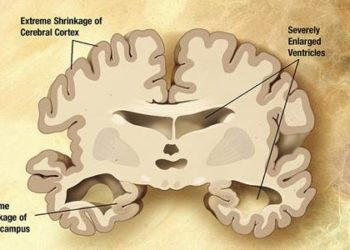#VisualAbstract: Efficacy and Safety of Lanabecestat for Treatment of Early and Mild Alzheimer Disease
1. While well-tolerated in early and mild Alzheimer’s disease, the BACE1 inhibitor lanabecestat was generally ineffective in slowing cognitive and functional decline.
Evidence Rating Level: 1 (Excellent)
Amyloid plaques and neurofibrillary tangles are defining pathological characteristics of Alzheimer’s disease (AD). Inhibitors of the beta-site APP-cleaving enzyme 1 (BACE1) may reduce the formation of Aβ peptides. Therefore, the objective of the AMARNATH and DAYBREAK-ALZ randomized, global multicenter, double-blind, placebo-controlled trials was to assess the effectiveness and safety of the BACE1 inhibitor lanabecestat in slowing cognitive deterioration and disease progression compared to placebo in early and mild AD. AMARANTH occurred over the course of 104 weeks, and included individuals across the spectrum from AD-related mild cognitive impairment (MCI) to mild AD dementia. DAYBREAK-ALZ similarly included mild AD dementia patients, with a 78-week placebo-controlled period, and a subsequent 78-week period during which all participants transitioned to lanabecestat. Participants were stratified by cognitive status at baseline and equally randomized to once-daily doses of 20mg lanabecestat, 50mg lanabecestat, or placebo. Evaluative tools to determine impairment were the 13-item Alzheimer Disease Assessment Scale-cognitive subscale (ADAS-Cog13), Alzheimer’s Disease Cooperative Study-Instrumental Activities of Daily Living Inventory (ADCS-iADL), Functional Activities Questionnaire (FAQ), Integrated Alzheimer’s Disease Rating Scale (iADRS), Clinical Dementia Rating-sum of boxes (CDR-SB), Neuropsychiatric Inventory (NPI), and Mini-Mental Status Examination (MMSE). Reported adverse events, weight and vital signs, laboratory tests, physical examination (e.g., neurological/imaging, dermatological), and suicidality were also assessed throughout the studies. Lastly, biomarkers related to amyloid markers (CSF Aβ-42 and Aβ-40), hippocampal volume (MRI), and amyloid burden (florbetapir PET) were evaluated. The primary outcome was change from baseline in the ADAS-Cog13. A total of 2,218 participants were eligible for AMARANTH (mean [SD] age = 71.3 [7.1] years) and 1,722 were eligible for DAYBREAK-ALZ (mean [SD] age = 72.3 [7.0] years). Baseline cognitive and functional scores were similar across studies in spite of their disease status differences, though all scored at least one SD below the population mean for MCI and three SDs below for mild AD. Both studies were discontinued early for futility, which likely impacted results. Incidence of deaths were similar across treatment groups in both of these studies; study discontinuation due to adverse events was highest in the 50mg lanabecestat group (difference 2.5%). Specifically,the 50mg lanabecestat group experienced increased hair hypopigmentation, and both lanabecestat groups resulted in a higher number of emergent psychiatric events. Regarding cognitive and functional capacities during the studies’ durations, lanabecestat did not slow decline compared to placebo. The 20mg and 50mg treatment arms in AMARANTH showed significantly greater hippocampal volume loss (-0.52% and -0.48%, respectively) compared to placebo, but these findings were not observed in DAYBREAK-ALZ. However, no significant differences were found in cognitive measures and, in certain cases, worsening of function was noted in lanabecestat groups without distinguishable differences between the two studies. Despite early termination, these large studies suggest that the BACE1 inhibitor lanabecestat does not appear to serve as a disease-modifying agent under current conditions.
Click to read the study in JAMA Neurology
©2019 2 Minute Medicine, Inc. All rights reserved. No works may be reproduced without expressed written consent from 2 Minute Medicine, Inc. Inquire about licensing here. No article should be construed as medical advice and is not intended as such by the authors or by 2 Minute Medicine, Inc.







